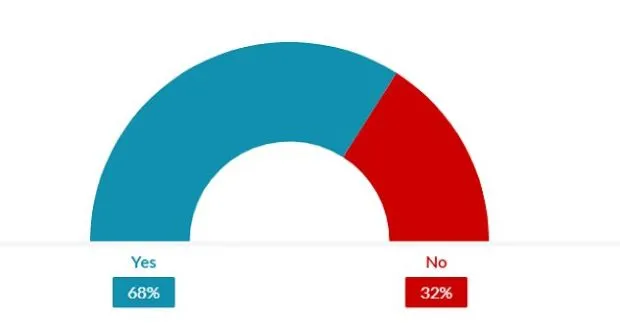
66.4%.
Last Friday, May the 25th, Ireland voted Yes to repeal the Eighth Amendment of our Constitution. This Amendment equated the life of a foetus to that of the person carrying it, thereby banning abortions in almost all circumstances and placing great barriers in the way of high-quality obstetric care during pregnancy and childbirth. It was voted into the Constitution in 1983, during an era when Ireland was still very much in thrall to the Catholic Church.
While the Eighth Amendment remained in place, those in need of terminations had to travel overseas or order unregulated, illegal abortion pills online. Under the Eighth Amendment, the ability of medical staff to provide the best possible care for their pregnant patients was limited. Terminations were allowed only in cases where a patient's death was imminent. The threat of a 14-year prison sentence hung over the head of any doctor, midwife or other medical professional who made the decision to terminate a pregnancy too early (i.e., before their patient was at death's door). This forced doctors to err on the side of caution and wait until patients were in grave danger.
Savita Halappanavar was one tragic victim of this situation. Her death in Galway on October the 28th, 2012 – arising from complications she suffered during a miscarriage – lit a great fire of rage within the hearts of pro-choice activists up and down the country. Had she been granted a termination when she initially requested it (upon realising that she was miscarrying), she would still be alive today. However, the staff treating her refused to perform the procedure while the foetus still retained a faint pulse, telling her: "this is a Catholic country." They did not intervene until the pulse stopped a few days later, by which time Savita had gone into severe septic shock and it was too late to save her. Savita's story kick-started the movement to repeal the Eighth Amendment.
She should never have had to die. This appalling injustice should never have been visited upon her and her family.

Last Friday, May the 25th, Ireland voted Yes to repeal the Eighth Amendment so that our abortion laws could be liberalised ... and we voted Yes by a margin so large that not even the most optimistic Repeal advocates could ever have imagined it.
66.4%.
The official legislation that will allow terminations to be performed without restriction (subject to a three-day waiting period) up to 12 weeks' gestation – and thereafter in cases of fatal foetal abnormality or serious risks to health – still has to pass through the Dáil and the Seanad. With such a large majority of Irish people having voted in favour of repealing the Eighth Amendment, there is unlikely to be any real opposition to the upcoming legislation in either house. The result of any national referendum – especially one as resounding as this – legally compels the Irish government to follow through on the wishes of the people.
Once the appropriate legislation has been passed, anyone with a womb in this country will be granted true bodily autonomy. They will have the right to make decisions about their pregnancies that work best for them and their families. The treatments they receive during pregnancy and childbirth can be guided by a principle of informed consent. Medical staff – doctors, nurses, midwives, obstetricians and others – can go about their work and act swiftly to save their patients' lives, whenever necessary, without having to be afraid of a draconian prison sentence looming over them.
No one will ever again be legally obliged to go through with a pregnancy when they know, deep in their hearts, that they are physically or mentally unable for it. I wholeheartedly believe that the best possible environment any child can be born into is one where they are truly loved and wanted. Making the commitment to raise a child is a truly awe-inspiring responsibility – as is the process of going through the challenging experience of pregnancy for nine months – and nobody should ever be coerced into making such a serious commitment when they know that they cannot cope with it.
I (along with many other people who hoped our country would vote Yes) thought that the result would be extremely tight. I did believe that the Repeal side would prevail, but I thought that our margin of victory would be in the low 50s: that we would have to eke out small wins, constituency by constituency; that rural Ireland would say No; and that we would be relying very heavily on votes from Dublin and other urban areas to get this over the line. I couldn't have been more wrong. The result was a landslide. A two-thirds majority. The country's verdict was emphatic and decisive.
66.4%.
As I sit here now, all I can say about that is ... I am truly sorry for the assumptions that I made about people in rural Ireland. I underestimated their great compassion and sensitivity. With my urban bias, I made sweeping assumptions about them that turned out to have no basis in reality, and I shouldn't have done that.
As it turns out, two-thirds of Irish people stand behind the right to choose. 39 out of 40 constituencies in the country backed the Repeal campaign. Rural Ireland as a whole returned an emphatic Yes vote: slightly lower than that of urban Ireland, maybe, but still a very strong result of 60%. It's hard to explain exactly what this means to me. It means I can now rest assured that if – God forbid – I ever found myself in a crisis situation, knowing that my life and health was in danger, I would never be forced to travel or procure illegal pills to obtain the care I needed.
Shortly after polls closed at 10.00 p.m. on May 25th, Ireland received its first indication that the referendum had passed by a huge majority. At that time, two exit polls were released which indicated that the Yes vote could be as high as 68 to 69%: an absolute landslide.


I hardly dared to believe my eyes, but as soon as ballot boxes were opened the following morning, it became clear that the exit polls had provided an accurate reflection of the final result. That day, I wandered through town with a couple of friends, feeling tearful and jubilant, dazed and sombre, all at once. Pro-choice activist Roe McDermott wrote in The Irish Times yesterday:
(This result) marks the end of a hard-fought battle that many activists have been fighting for literally decades. But I don’t feel fantastic. I don’t feel joyful. And speaking to women over the weekend, I know I am not alone. Yes, our country has finally acknowledged our humanity, acknowledged our right to bodily autonomy, acknowledged that we are more than wombs and vessels. But frankly, that’s a low bar. And it’s late. And it doesn’t undo the damage that has already been inflicted, doesn’t undo this country’s history of cruelty and oppression. So I felt relieved, but far from joyous.

These sentiments are shared by many. As my friend and I visited a beautiful mural in Dublin city centre that had been created in honour of Savita, our hearts continued to ache for the memories of all those for whom this result had come too late. Savita. Miss X: a pregnant and suicidal rape victim who was denied the right to travel abroad for an abortion in 1992, when she was just fourteen years of age. If she is still alive today, I hope she has witnessed this result and knows that the country stands behind her now, in a way that it could not back in 1992. Miss P: a pregnant woman who was artificially kept alive in 2014 when she was clinically brain-dead, following a tragic accident. Even though her family begged for her to be permitted to pass away with dignity, the Eighth Amendment dictated that she must be kept alive to support her foetus ... despite the fact that there was no hope of the pregnancy developing in a healthy way in a body that was already beginning to decompose. Miss P's family were forced to endure a highly stressful and intrusive court case in order to have her life support switched off. Miss Y: an asylum seeker who arrived into Ireland in 2014 after having been raped in her home country. She unsuccessfully sought to procure an abortion and was ultimately forced to carry the pregnancy to full term and undergo a Caesarean section.
The history of this country under the Eighth Amendment is littered with heart-wrenching stories. The In Her Shoes Facebook page played an enormous role during the referendum campaign: raising awareness of the many reasons why someone would seek an abortion and exposing the hypocrisy of forcing these people to travel overseas or risk their health (and that 14-year prison sentence I mentioned earlier) by going through an abortion on their own, using illegal abortion pills, without any access to medical supervision or support.
66.4%.
Savita should never have had to die. I am ashamed by the fact that this country forced her husband and family to endure the unspeakable pain of losing her. I hope that with this vote, we have done some justice to her, but that doesn't take away the fact that this vibrant, warm-hearted woman – along with countless other victims of the Eighth Amendment – is no longer with us.
May you rest in peace, Savita. You will always be remembered as the one who drove this movement forward. The people of Ireland will forever be in your debt.
